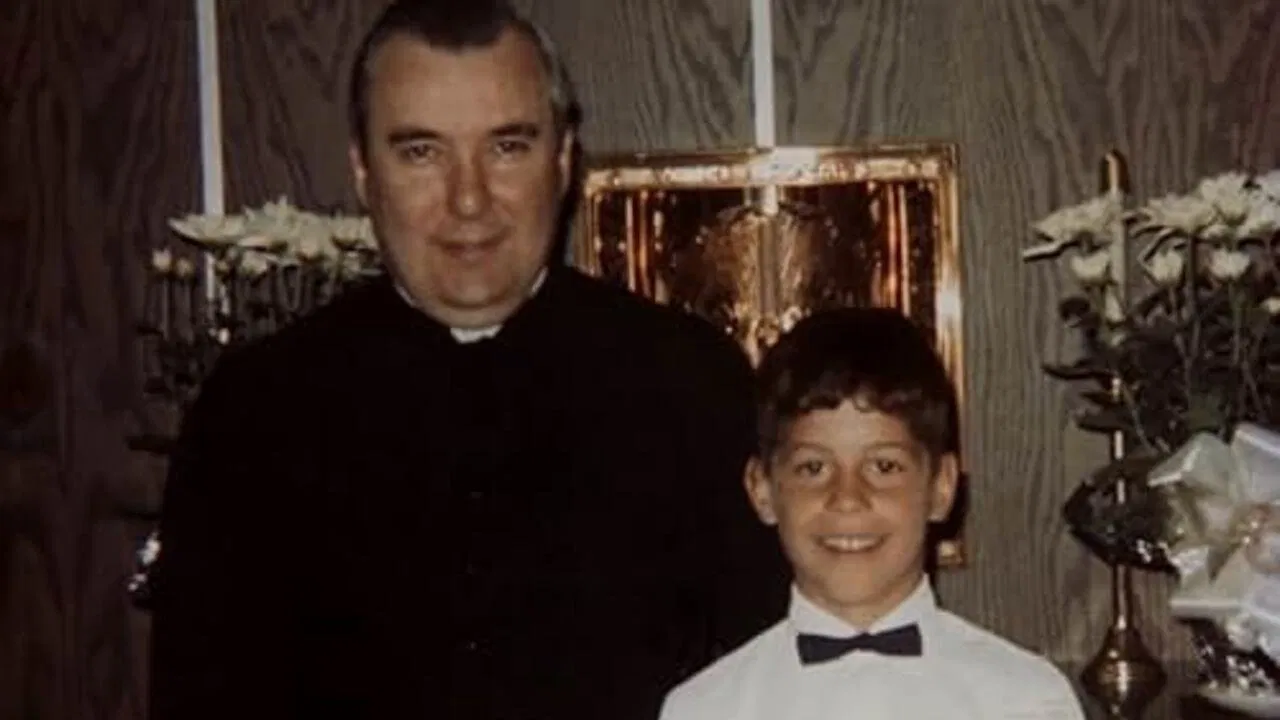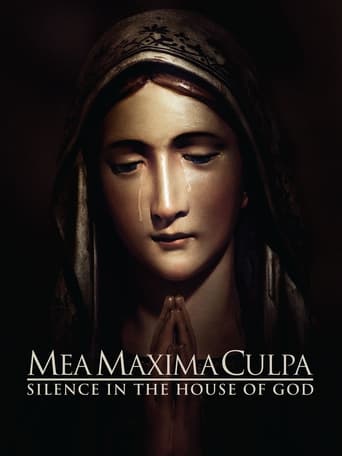

The documentary "Mea Maxima Culpa: Silence in the House of God", BY Alex Gibney is a film about the charges of paedophelia and clerical sexual abuse in the Catholic Church against on Catholic priest, and the inner workings and the bureaucracy inside the Church that lead others to question its actions and the relation of these charges which lead up all the way to the Vatican itself. It follows of the story of four deaf men who were sexually abused by priests and other clerical members of the Catholic Church in the 1960's who set out to expose them. Throughout the movie, more and more complications in the inner workings and system of the Catholic Church are revealed.From a Catholic's perspective, I felt that this film did really well in its efforts to expose this issue of sexual abuse in the Catholic Church. It shocks me that even Catholic priests are capable of committing heinous acts such as these. Throughout the movie, it continues to question the morals of the Catholic Church, its failure to act upon these charges even upon His Holiness Pope John Paul II, and how a crime like this actually went unpunished.I really enjoyed enjoyed this film because of the message and stand it took against combating sexual abuse in the Catholic Church. I really appreciated that Mr. Gibney was not at all afraid to portray these controversial topics such as paedophilia. I also like the scenes wherein he tried to portray the scenes that suggested the children were being sexually abused in the middle of the night, without showing any graphic sexual content. Another thing I liked was the underlying theme of the film: Silence in the House of God, which truly reflects on some of the priests who abuse their power. It made me wonder how these priests who preached everyday to people on how to live their lives were themselves committing such grave and heinous crimes. Overall I enjoyed the number of facts this movie has stated leading up to this issue. With this movie I rate it an 8.1 out of 10.
... View MoreFrom acclaimed documentarian Alex Gibney, comes a potent examination of the history of sex abuse and paedophilia within the Catholic Church. Told through the eyes of victims, Gibney follows the murky trail of sex abuse from Wisconsin all the way up to the Vatican.This is not for the faint hearted or easily disturbed. That we may understand the term 'documentary', speaks volumes of how successfully Gibney has reinvented the genre, creating something that is as much horror as it is non-fiction. We are plunged into the dark recesses of traumatic experience, and exposed to the sheer scope of institutionalised child molestation. Revelation after revelation, horror after horror, we witness very real and powerful emotion on screen, producing a 'documentary' that enthrals and terrifies.The inclusion of Terry, Arthur and Gary, 3 victims integral to the first known case of protest against clerical sex abuse in the US, is a genuine masterstroke. This level of realism is perhaps expected of the documentary format, however, Gibney's overall production results in something much more effective. From confession-booth like interviews to complex animated graphics, Mea Maxima Culpa is educational yet highly creative. Aside from the cinematographic merits and qualities of story-telling, significant effort is made to defrock hidden truths of organised child molestation and the lengths taken to cover it up. The trail from the pulpits of Milwaukee to the highest echelons of the Vatican is made to seem more concrete than ever before.Verdict: Expertly constructed and magnificently told, Mea disturbs ones very core. Gibney has exquisitely created an amalgam of documentary and horror with a profound respect to the stories of its protagonists. Prepare to be infuriated, terrified and astounded without rest. Essential viewing.
... View MoreThis is an excellent documentary on how the Catholic Church has let down its people. Child Sexual abuse has long been a problem in the Church. That's not to say that other religions have had their problems too. It focuses on how sexual abuse, especially in deaf community and it was so rampant. The film gives great insight on how the Catholic Church succeeded in creating a massive cover up. It evens show how Pope Benedict XVI, then Cardinal Ratzinger played a vital role in covering up the abuse happening worldwide. The film may make you bitter, even angry, but for those of us who are Catholic it's an amazing outpouring of sadness. I found myself doing more research on this subject. The victims in the film pour out their heart and souls, and even though they were deaf and they signed their lines, you are offered the opportunity to hear what they are saying with excellent guest star voices. Even the use of photography where the zoomed in on the hands signing was awesome, I felt their grief through their sign language. The cinematography is excellent and the use of old film footage makes you feel like you are there. In my opinion a must see film, especially if you are Catholic. It sends a clear message that the Church has a long road ahead in rebuilding its trust with its congregation.
... View MoreAfter looking at the world of NHL pugilists in last year's outstanding The Last Gladiators, Mea Maxima Culpa: Silence In The House Of God finds director Alex Gibney returning to investigating abuses of power, a theme that has served him well in past efforts like Enron: The Smartest Guys In The Room and the Oscar-winning Taxi To The Dark Side. This disturbing exposé on the problem of child and youth sexual abuse in the Catholic Church focuses partly on the stories of five deaf men who are thought to be the first individuals to ever publicly protest abuses by clergy in the United States, after they were victimized by Father Lawrence Murphy at St. John's School for the Deaf in the suburbs of Milwaukee during the 60s and 70s. Gibney also takes a broader view of the subject by looking at other cases of clergy abuse (notably in Ireland) and the systematic cover-ups of these crimes by the Catholic Church's top officials, whose unofficial policy on the matter is to "deny, minimize, and blame", according to one journalist interviewed. "Mea Maxima Culpa's" Latin translation is "my most grievous fault".Although the five St. John's victims have been working for over three decades to call attention to the issue and seek justice for their suffering, their story gained traction after New York Times writer Laurie Goodstein wrote an article in 2010 about the Vatican's failure to defrock Murphy, despite the fact that they were presented with undeniable evidence of his crimes and received strong warnings from some American church officials. Murphy is believed to have molested over 200 boys at the boarding school from the 50s until 1974, when he was transferred to another parish. The Vatican was alerted of Murphy's behaviour in 1963 and did nothing. Actors Jamey Sheridan, Chris Cooper, Ethan Hawke, and John Slattery give voice to the victims, who use sign language with punctuated hand slaps to express the horrors they endured at the hand of Murphy and the shame that followed. Murphy's textbook predatory behaviour found him singling out what he perceived as the weaker students and further exploiting the fact that they faced an obvious barrier in communicating over the phone with their families. Three of the victims, including Terry Kohut, who sued the Catholic Church and named the current Pope in his lawsuit, were on hand for the world premiere TIFF screening I attended and gave their emotional reaction to it afterwards at the Q & A through a sign language interpreter. Just knowing that they were in the audience and reliving their pain while seeing the finished film for the first time added an extra significance and weight to the proceedings.The investigations resulting from the Kohut lawsuit ended up leading to the discovery of secret Vatican documents that detailed many instances of sexual abuse cover-ups that reach to the highest levels of the Catholic Church, with Popes John Paul II and Benedict XVI (then Cardinal Joseph Ratzinger) substantially implicated. In the years before being anointed Pope, Ratzinger oversaw a Vatican council that monitored sexual abuse cases in the Church, so his post-anointment claims of being unaware of most of what was occurring seem highly unlikely. How his and his predecessor's culpability and mishandling of these tragic cases hasn't been a much larger media story is difficult to understand.That aside, overall media coverage of child and youth sexual abuse in the Catholic Church has, sadly, become an all-too-familiar story that one almost becomes numb to. Gibney rises to the challenge of presenting a fresh take on a much-discussed important subject with this well-researched and powerful film. My only real negative about it are the re-enactments that Gibney employs, even if they are artfully composed and beautifully shot, using plenty of religious imagery. Re-enactments are a staple of Gibney's work (not to mention Errol Morris'), but the stories he tells are usually compelling enough and, in my opinion, the end results are slightly diminished with this gimmicky device that feels like an imagination crutch for the audience.
... View More